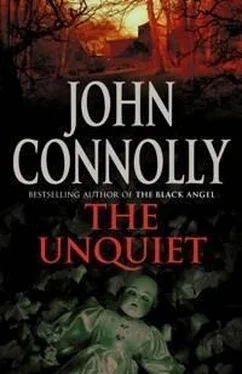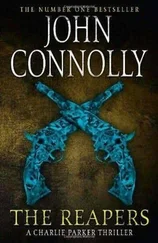M: I understand. It means I can’t go near her no more, else you put my ass back in jail.
F: That’s right. You going to abide by that order? You don’t plan to, and you can save us all some time right now
M: I’ll abide by it.
C: Maybe you’ll think about leaving the state too. We’d like you to do that.
M: I can’t promise nothing on that front. I’m a free man. I done my time. Got a right to go where I choose.
C: That include hanging around houses up in Falmouth?
M: I ain’t never been to Falmouth. Hear it’s real nice, though. I like being by the water.
C: Car like yours was seen around there last night.
M: Lots of cars like mine. Red is a real popular color.
C: Nobody said it was a red car.
M: (silent)
C: You hear me? How come you knew it was a red car?
M: Car like mine, what else would it be? If ’n it was a blue car, or a green car, then it wouldn’t be like mine. Have to be a red car to be like mine, just the way you said it.
F: You loan your car out to other people, Mr. Merrick?
M: No, I don’t.
F: So if we find out that it was your car-and we can do that, you know; we can take casts, canvass witnesses-then it would have to be you behind the wheel, right?
M: I guess so, but since I wasn’t there, it’s moot.
F: Moot?
M: Yeah, you know what “moot” means, Officer. Don’t need me to explain it to you.
F: Who are the other men with you?
M: (confused) Other men? The hell you talking about?
F: We know you’re not here alone. Who did you bring with you? Who’s helping you? You’re not doing all this without others.
M: I always work alone.
C: And what kind of work would that be?
M: (smiling) Problem solving. I’m a lateral thinker.
C: You know, I don’t think you’re being as cooperative as you should be.
M: I’m answering your questions, ain’t I?
F: Maybe you’ll answer them better after a couple of nights in jail.
M: You can’t do that.
C: Are you telling us what we can and can’t do? Listen, you may have been a big shot once upon a time, but that doesn’t count for anything up here.
M: You got no more cause to hold me. I told you I’d abide by that order.
F: We think you need some time to reflect on what you’ve been doing, to, uh, meditate on your sins.
M: I’m done talking to you. I want to call me a lawyer.
That was it. The interrogation was over. Merrick was given access to a phone. He called Eldritch who, it emerged, had taken the Maine bar exam, along with its equivalents in New Hampshire and Vermont. He told Merrick not to answer any more questions, and arrangements were made to transfer Merrick to the Cumberland County Jail, since Scarborough no longer had holding cells of its own.
“The lawyer won’t be able to get him out until Monday morning at the earliest,” said O’Rourke. “The judges do like to keep their weekends clear.”
Even if Merrick was charged, it was likely that Eldritch would arrange bail for him if it was still in the interests of Eldritch’s other client that Merrick should be free, just as it seemed to be in O’Rourke’s interests. The only person whose interests might not be well served by Merrick’s freedom was Rebecca Clay.
“I have some people keeping watch over Ms. Clay,” I told O’Rourke. “She wants to cut them loose, but I think she may need to reconsider, just until we get a sense of how Merrick reacts to all this.”
“Who are you using?”
I shifted awkwardly in my seat.
“The Fulcis, and Jackie Garner.”
O’Rourke laughed, attracting surprised glances from the men around him.
“No way! That’s like using a pair of undercover elephants, and their ringmaster.”
“Well, I kind of wanted him to see them. The object of the exercise was to keep him away.”
“Hell, they’d keep me away. Probably kept the birds away too. You really do pick entertaining friends.”
Yeah, I thought, but he didn’t know the half of it. The really entertaining ones had just arrived.
The streets were thick with buses by the time I made it back from Scarborough to the Cumberland County Civic Center: yellow school buses, Peter Pan Trailways, in fact just about anything that had wheels and could accommodate more than six people. The Pirates were on a roll. Under coach Kevin Dineen they were at the top of the Atlantic Division of the AHL’s Eastern Conference. Earlier in the week they had beaten their nearest rivals, the Hartford Wolf Pack, 7-4. Now it was the turn of the Springfield Falcons and it looked like about five thousand fans had made their way to the Civic Center for the game.
Inside the arena, Crackers the Parrot was entertaining the crowd. To be more accurate, he was entertaining most of the crowd. There were some people just didn’t want to be entertained.
“This has got to be the dumbest game ever,” said Louis. He was dressed in a gray cashmere coat over a black jacket and trousers, his hands thrust deep into the pockets of the coat, his chin buried in the folds of his red scarf. He acted like he’d just been forced out of a train somewhere in the middle of Siberia. His mildly Satanic beard had been dispensed with, and his hair was even more ruthlessly cut back than usual, its gray touches now barely visible. He and Angel had arrived earlier that day. I had bought a couple of extra tickets in case they wanted to come along to the game, but Angel had somehow managed to pick up a cold in Napa and was back at my place feeling sorry for himself. That left Louis as my reluctant escort for the evening.
Things between us had changed over the last year. In a way, I had always been closer to Angel. I knew more about his past, and when I was, however briefly, a cop, I had done what I could to help and protect him. I had seen something in him-even now I found it hard to explain precisely what it was, but perhaps it was a kind of decency, an empathy with those who had suffered, albeit one filtered murkily through his criminality-and had responded to it. I had seen something in his partner, too, but it was very different. Long before I had fired a gun in anger, Louis had killed. At first, he had done so out of a rage of his own, but he had quickly discovered he had a talent for it, and there were those who had been willing to pay him to utilize that ability on their behalf. He was once, I thought, not so different from Frank Merrick, although his moral compass had become surer than Merrick ’s had ever been.
Yet Louis was also, I knew, not so different from me. He represented a side of me that I had long been reluctant to acknowledge-the urge to strike out, the impulse toward violence-and his presence in my life had forced me to come to terms with it, and, through that accommodation, to control it. In turn, I thought that I had given him an outlet for his own anger, a way of engaging with, and altering, the world that was worthy of him as a man. We had seen things in this last year that had changed both of us, confirming suspicions that we had both held about the nature of the honeycomb world but had rarely shared. We had found a common ground, however hollow it might have sounded beneath our feet.
“You know why you don’t see no black men playing this game?” he continued. “A) Because it’s slow. B) Because it’s dumb. And C) Because it’s cold. I mean, look at these guys.” He flicked through the pages of the official program. “Most of them ain’t even American. They’re Canadian. Like you don’t have enough slow-ass white men of your own, you got to import them from Canada.”
“We like giving jobs to Canadians,” I said. “It gives them the chance to earn some real dollars.”
“Yeah, I bet they send it back to their families, like in the Third World.” He watched with obvious disdain as the mascot frolicked on the ice. “Parrot is more of an athlete than they are.”
Читать дальше












